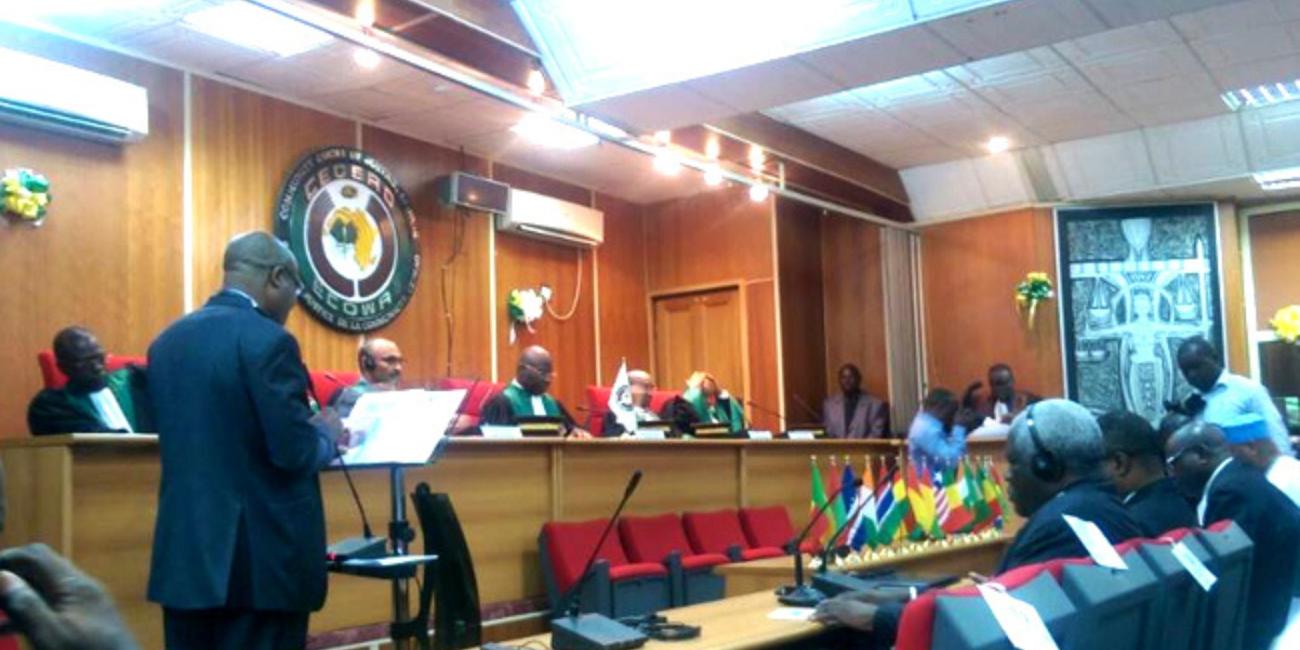
The application, filed by Rhahor through his legal counsel, Andrew N. Elekeokwuri, Esq. of Andrew Ewoh & Co., challenges the legitimacy of his trial, conviction, and death sentence handed down by the Delta State High Court in July 2024.
A legal battle is unfolding at the Community Court of Justice of the Economic Community of West African States (ECOWAS) in Abuja, as the regional court formally registered a human rights application on July 17, 2025, in Suit No: ECW/CCJ/APP/34/25, brought by Nigerian death row inmate, Orikri Rhahor, against the Federal Republic of Nigeria.
The application, filed by Rhahor through his legal counsel, Andrew N. Elekeokwuri, Esq. of Andrew Ewoh & Co., challenges the legitimacy of his trial, conviction, and death sentence handed down by the Delta State High Court in July 2024.
The suit accuses the Nigerian state of gross violations of fundamental human rights guaranteed under the 1999 Constitution of Nigeria, the African Charter on Human and Peoples’ Rights, the International Covenant on Civil and Political Rights (ICCPR), and binding ECOWAS protocols.
According to court documents, the ECOWAS Court has officially served notice on the Defendant, the Federal Republic of Nigeria, through the office of the Attorney-General of the Federation and Minister of Justice in Abuja.
The government is now mandated to file a defence within 30 days of receipt or risk judgment being entered against it by default.
The heart of the Applicant’s case lies in the circumstances surrounding his prosecution in Charge No. EHC/35C/2020. Rhahor, who pleaded not guilty, was prosecuted by the Delta State Government and tried before Hon. Justice Michael Nduka Obi. On July 10, 2024, the judge sentenced Rhahor to death by hanging.
However, in what has triggered international scrutiny, the judge, according to a certified copy of the judgment now before the ECOWAS Court as Exhibit A, held that the Applicant’s defence “rested on the case of the prosecution.”
The Applicant argues that this meant the judge based his verdict entirely on unchallenged prosecution evidence, without any substantive analysis of a defence case, or effort to ensure the accused was given a fair opportunity to defend himself.
The defence counsel neither called witnesses nor cross-examined the prosecution’s. Legal experts say such practice contradicts well-established standards of criminal justice, especially where a defendant’s life is at stake.
Rhahor contends that his right to a fair hearing under Section 36 of the Nigerian Constitution and Articles 6 and 7 of the African Charter was violated.
He also alleged that the conduct of his defence counsel — by resting the case on that of the prosecution without explanation — constituted ineffective legal representation.
The result, he argues, was a fundamentally flawed trial process that has left him awaiting execution under an illegitimate conviction.
Citing Sections 135 to 140 of the Administration of Criminal Justice Act (ACJA) 2015, the suit underscores that presumption of innocence, duty to evaluate evidence, and the right to be heard must be strictly observed in criminal proceedings.
Rhahor argued that the standards were abandoned in his case.
He further asserts that the breach of procedure amounts not just to a miscarriage of justice, but also arbitrary detention and cruel, inhuman and degrading treatment — prohibited under both Nigerian and international law.
In addition to Exhibit A, Rhahor has submitted a sworn affidavit as Exhibit B, providing detailed testimony of his arrest, prosecution, conviction, and current conditions of detention.
He described life on death row as psychologically torturous, degrading, and in violation of human dignity.
He maintained that he had exhausted domestic remedies or that such remedies are ineffective, hence his resort to the ECOWAS Court.
The reliefs sought by the Applicant are wide-ranging and impactful. He is asking the Court to declare his trial and conviction unlawful, order the immediate quashing of the sentence, mandate his unconditional release from prison, and award him the sum of fifty million United States dollars ($50,000,000) as compensation for general, aggravated, and exemplary damages suffered due to the alleged rights violations.
The Federal Republic of Nigeria, as a member state of ECOWAS and a signatory to the relevant international instruments, is bound by the decisions of the regional court. Legal analysts are closely watching the case, warning that a ruling in favour of the Applicant could cast a sharp spotlight on Nigeria’s criminal justice system and its handling of capital cases.
With Nigeria now formally notified and the deadline for its defence ticking, the ECOWAS Court is preparing to hear what may become one of the most consequential human rights cases of the year.
“If the Court finds that the Applicant’s rights were indeed violated and grants the orders requested, it could signal a major precedent for the accountability of national courts under regional law and reaffirm the ECOWAS Court’s role as a last resort for victims of justice gone wrong.”

